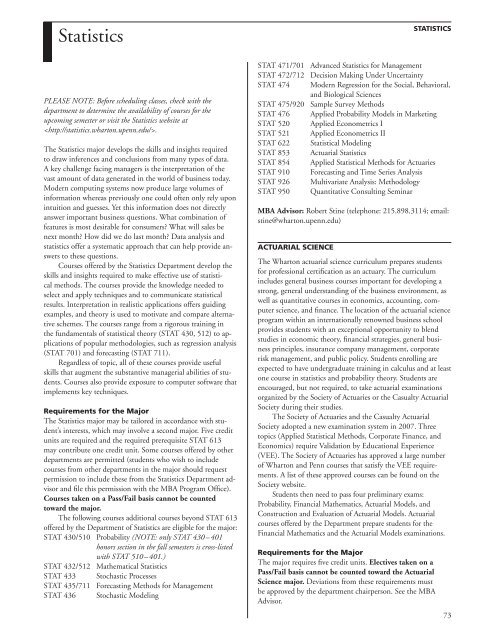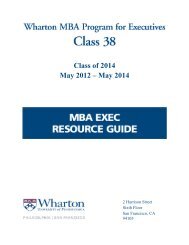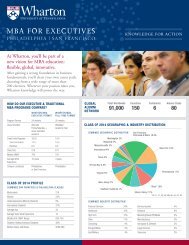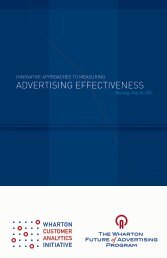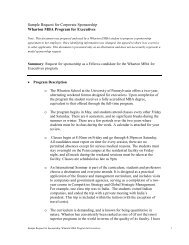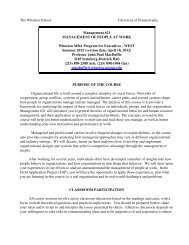Explore Options; Plan Your MBA Academic Program
Explore Options; Plan Your MBA Academic Program
Explore Options; Plan Your MBA Academic Program
Create successful ePaper yourself
Turn your PDF publications into a flip-book with our unique Google optimized e-Paper software.
Statistics<br />
Please note: Before scheduling classes, check with the<br />
department to determine the availability of courses for the<br />
upcoming semester or visit the statistics website at<br />
.<br />
The Statistics major develops the skills and insights required<br />
to draw inferences and conclusions from many types of data.<br />
A key challenge facing managers is the interpretation of the<br />
vast amount of data generated in the world of business today.<br />
Modern computing systems now produce large volumes of<br />
information whereas previously one could often only rely upon<br />
intuition and guesses. Yet this information does not directly<br />
answer important business questions. What combination of<br />
features is most desirable for consumers? What will sales be<br />
next month? How did we do last month? Data analysis and<br />
statistics offer a systematic approach that can help provide answers<br />
to these questions.<br />
Courses offered by the Statistics Department develop the<br />
skills and insights required to make effective use of statistical<br />
methods. The courses provide the knowledge needed to<br />
select and apply techniques and to communicate statistical<br />
results. Interpretation in realistic applications offers guiding<br />
examples, and theory is used to motivate and compare alternative<br />
schemes. The courses range from a rigorous training in<br />
the fundamentals of statistical theory (STAT 430, 512) to applications<br />
of popular methodologies, such as regression analysis<br />
(STAT 701) and forecasting (STAT 711).<br />
Regardless of topic, all of these courses provide useful<br />
skills that augment the substantive managerial abilities of students.<br />
Courses also provide exposure to computer software that<br />
implements key techniques.<br />
Requirements for the Major<br />
The Statistics major may be tailored in accordance with student’s<br />
interests, which may involve a second major. Five credit<br />
units are required and the required prerequisite STAT 613<br />
may contribute one credit unit. Some courses offered by other<br />
departments are permitted (students who wish to include<br />
courses from other departments in the major should request<br />
permission to include these from the Statistics Department advisor<br />
and file this permission with the <strong>MBA</strong> <strong>Program</strong> Office).<br />
Courses taken on a Pass/Fail basis cannot be counted<br />
toward the major.<br />
The following courses additional courses beyond STAT 613<br />
offered by the Department of Statistics are eligible for the major:<br />
STAT 430/510 Probability (note: only stat 430 – 401<br />
honors section in the fall semesters is cross-listed<br />
with stat 510 – 401.)<br />
STAT 432/512 Mathematical Statistics<br />
STAT 433 Stochastic Processes<br />
STAT 435/711 Forecasting Methods for Management<br />
STAT 436 Stochastic Modeling<br />
STAT 471/701 Advanced Statistics for Management<br />
STAT 472/712 Decision Making Under Uncertainty<br />
STAT 474 Modern Regression for the Social, Behavioral,<br />
and Biological Sciences<br />
STAT 475/920 Sample Survey Methods<br />
STAT 476 Applied Probability Models in Marketing<br />
STAT 520 Applied Econometrics I<br />
STAT 521 Applied Econometrics II<br />
STAT 622 Statistical Modeling<br />
STAT 853 Actuarial Statistics<br />
STAT 854 Applied Statistical Methods for Actuaries<br />
STAT 910 Forecasting and Time Series Analysis<br />
STAT 926 Multivariate Analysis: Methodology<br />
STAT 950 Quantitative Consulting Seminar<br />
<strong>MBA</strong> Advisor: Robert Stine (telephone: 215.898.3114; email:<br />
stine@wharton.upenn.edu)<br />
ACTUARIAL SCIENCE<br />
STATISTICS<br />
The Wharton actuarial science curriculum prepares students<br />
for professional certification as an actuary. The curriculum<br />
includes general business courses important for developing a<br />
strong, general understanding of the business environment, as<br />
well as quantitative courses in economics, accounting, computer<br />
science, and finance. The location of the actuarial science<br />
program within an internationally renowned business school<br />
provides students with an exceptional opportunity to blend<br />
studies in economic theory, financial strategies, general business<br />
principles, insurance company management, corporate<br />
risk management, and public policy. Students enrolling are<br />
expected to have undergraduate training in calculus and at least<br />
one course in statistics and probability theory. Students are<br />
encouraged, but not required, to take actuarial examinations<br />
organized by the Society of Actuaries or the Casualty Actuarial<br />
Society during their studies.<br />
The Society of Actuaries and the Casualty Actuarial<br />
Society adopted a new examination system in 2007. Three<br />
topics (Applied Statistical Methods, Corporate Finance, and<br />
Economics) require Validation by Educational Experience<br />
(VEE). The Society of Actuaries has approved a large number<br />
of Wharton and Penn courses that satisfy the VEE requirements.<br />
A list of these approved courses can be found on the<br />
Society website.<br />
Students then need to pass four preliminary exams:<br />
Probability, Financial Mathematics, Actuarial Models, and<br />
Construction and Evaluation of Actuarial Models. Actuarial<br />
courses offered by the Department prepare students for the<br />
Financial Mathematics and the Actuarial Models examinations.<br />
Requirements for the Major<br />
The major requires five credit units. Electives taken on a<br />
Pass/Fail basis cannot be counted toward the Actuarial<br />
Science major. Deviations from these requirements must<br />
be approved by the department chairperson. See the <strong>MBA</strong><br />
Advisor.<br />
73


